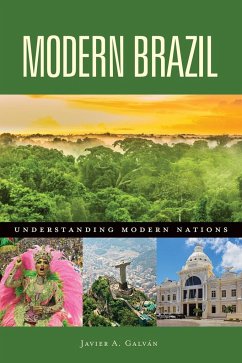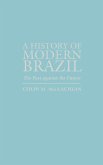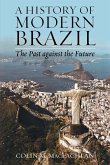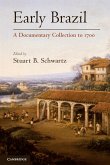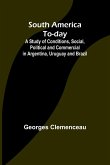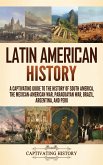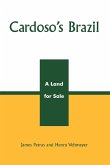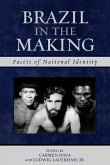Javier Galvan
Modern Brazil
Javier Galvan
Modern Brazil
- Gebundenes Buch
- Merkliste
- Auf die Merkliste
- Bewerten Bewerten
- Teilen
- Produkt teilen
- Produkterinnerung
- Produkterinnerung
This book is a crucial reference source for high school and undergraduate college students interested in contemporary Brazil. While it provides a general historical and cultural background, it also focuses on issues affecting modern Brazil. In recent years, Brazil has come onto the world stage as an economic powerhouse, a leader in Latin America. This latest addition to the Understanding Modern Nations series focuses on Brazil's culture, history, and society. This volume provides readers with a wide understanding of Brazil's historical past, the foundation for its cultural traditions, and an…mehr
Andere Kunden interessierten sich auch für
![A History of Modern Brazil A History of Modern Brazil]() Colin M. MaclachlanA History of Modern Brazil138,99 €
Colin M. MaclachlanA History of Modern Brazil138,99 €![A History of Modern Brazil A History of Modern Brazil]() Colin M. MaclachlanA History of Modern Brazil52,99 €
Colin M. MaclachlanA History of Modern Brazil52,99 €![Early Brazil Early Brazil]() Early Brazil35,99 €
Early Brazil35,99 €![South America To-day ;A Study of Conditions, Social, Political and Commercial in Argentina, Uruguay and Brazil South America To-day ;A Study of Conditions, Social, Political and Commercial in Argentina, Uruguay and Brazil]() Georges ClemenceauSouth America To-day ;A Study of Conditions, Social, Political and Commercial in Argentina, Uruguay and Brazil18,99 €
Georges ClemenceauSouth America To-day ;A Study of Conditions, Social, Political and Commercial in Argentina, Uruguay and Brazil18,99 €![Latin American History Latin American History]() Captivating HistoryLatin American History32,99 €
Captivating HistoryLatin American History32,99 €![Cardoso's Brazil Cardoso's Brazil]() James PetrasCardoso's Brazil49,99 €
James PetrasCardoso's Brazil49,99 €![Brazil in the Making Brazil in the Making]() Brazil in the Making53,99 €
Brazil in the Making53,99 €-
-
-
This book is a crucial reference source for high school and undergraduate college students interested in contemporary Brazil. While it provides a general historical and cultural background, it also focuses on issues affecting modern Brazil. In recent years, Brazil has come onto the world stage as an economic powerhouse, a leader in Latin America. This latest addition to the Understanding Modern Nations series focuses on Brazil's culture, history, and society. This volume provides readers with a wide understanding of Brazil's historical past, the foundation for its cultural traditions, and an understanding of its social structure. In addition, it provides a look into contemporary society by highlighting both national accomplishments and challenges Brazilians face in the twenty-first century. Specific chapters cover geography; history; government and politics; economy; religion; social classes and ethnicity; gender, marriage and sexuality; education; language; etiquette; literature and drama; arts and architecture; music and dance; food; leisure and sports; and media, cinema, and popular culture. Entries within each chapter look at topics such as cultural icons, economic inequalities, race and ethnicity, soccer, politics, environmental conservation, and women's rights. Ideal for high school and undergraduate students, this volume paints a panoramic overview of one of the most powerful countries in the Americas.
Produktdetails
- Produktdetails
- Verlag: ABC-Clio, LLC
- Seitenzahl: 432
- Erscheinungstermin: 4. August 2020
- Englisch
- Abmessung: 260mm x 183mm x 28mm
- Gewicht: 1003g
- ISBN-13: 9781440860317
- ISBN-10: 1440860319
- Artikelnr.: 59976452
- Herstellerkennzeichnung
- Libri GmbH
- Europaallee 1
- 36244 Bad Hersfeld
- gpsr@libri.de
- Verlag: ABC-Clio, LLC
- Seitenzahl: 432
- Erscheinungstermin: 4. August 2020
- Englisch
- Abmessung: 260mm x 183mm x 28mm
- Gewicht: 1003g
- ISBN-13: 9781440860317
- ISBN-10: 1440860319
- Artikelnr.: 59976452
- Herstellerkennzeichnung
- Libri GmbH
- Europaallee 1
- 36244 Bad Hersfeld
- gpsr@libri.de
Javier A. Galván
Series Foreword
Preface
Introduction
Chapter 1: Geography
Overview
Amazon Basin and Rain Forest
Brasília and the Federal District
Climate
Deforestation
Earth Summit, Rio 2012
Environment
Infrastructure: Roads, Airports, Ports, and Railways
Interoceanic Highway
Islands and Archipelagos
Itaipú Hydroelectric Power Plant
Main Cities and Urban Regions
Major Rivers
Mendes, Chico (1944-1988)
Offshore Oil and Natural Gas
The Sertão and Devastating Droughts
World Heritage Sites in the UNESCO
Chapter 2: History
Overview
Timeline
Álvares Cabral, Pedro (1467 or 1468-1520)
Bandeirantes
Brazilian Empire: Pedro I (1798-1834) and Pedro II (1825-1891)
Captaincy Colonial System
Gold Rush and Minas Gerais
Isabel, Princess Regent of Brazil (1846-1921)
Kubitschek de Oliveira, Juscelino (1902-1976)
Operation Condor and Military Rule
Paraguayan War (1864-1870)
Silva, Benedita da (1942-)
Slavery, Abolition, and African Heritage
Tiradentes (1746-1792) and the Inconfidência Mineira
Vargas, Getúlio (1882-1954)
Chapter 3: Government and Politics
Overview
Constitutions
Corruption and Political Scandals
Electoral System
Foreign Policy
Human Rights
Law Enforcement
Lula da Silva, Luiz Inácio (1945-)
Political Parties
Political Patronage
Rousseff, Dilma (1947-)
Temer, Michel (1940-)
United Nations and Brazil
Women's Rights
Workers' Party (PT) in Power
Chapter 4: Economy
Overview
Agrarian Reform
Austerity Measures of 2016
Automobile Industry
BRICS Economic Group
Cardoso, Fernando Henrique (1931-)
Coffee Exports
Embraer, Empresa Brasileira de Aeronáutica
Energy Industry: Electricity, Oil, Ethanol, and Renewable Sources
Favelas (Slums)
Foreign Investment
Labor Migration
Major Exports
Manufacturing
Mercosul/Mercosur
Mineral Wealth
Petrobras, the National Oil Company
Stock Exchanges: Bovespa, BM&F, and B3
Tourism
Trading Partners
World Trade Organization (WTO)
Chapter 5: Religion and Thought
Overview
Candomblé and Macumba
Catholicism
De Souza Chaui, Marilena (1941-)
Freire, Paulo (1921-1997)
Freyre, Gilberto (1900-1987)
Liberation Theology
Messianism and Miracle Workers
Nossa Senhora Aparecida, Brazil's Patron Saint
Orixás, African Gods
Protestant Religions
Spiritism
Universal Church of the Kingdom of God
Chapter 6: Social Classes and Ethnicity
Overview
African Ancestry and Influence
Distribution of Wealth and Income Disparity
Education and Upward Mobility
Favelas, Mocambos, and Alagados (Slums)
Indigenous Populations
Landless Rural Workers Movement (MST)
Mixed Ethnicities: Caboclo, Cafuso, Mameluco, and Mulatto
Modern Immigration
Parentela
Poverty, Social Conflict, and Protests
Racism and Discrimination
Urban Crime
Chapter 7: Gender, Marriage, and Sexuality
Overview
Abortion Laws
Dating and Courting
Desquite and Divorce
Domestic Violence
Feminism
Gender and Parenting Roles
Gender Equality
LGBTQ Community and Rights
Maternity and Paternity Leave
Raising Children
Representation in Government
Representation in the Workforce
Suffrage
Wedding Traditions and Celebrations
Chapter 8: Education
Overview
Affirmative Action Policies
Ávila, Artur (1979-)
Bolsa Família: Welfare Program with Education Incentives
Education Reforms of 2016
Higher Education and Major Universities
INEP, National Institute for Educational Studies and Research
Literacy Rates
Private, International, and Religious Schools
Public Education: Elementary and Secondary Schooling
Scientific and Technical Research
Unipalmares, University for Afro-Descendent Students
Vestibular Testing for College Admission
Chapter 9: Language
Overview
Formality Levels
Hand Gestures
Indigenous Languages
Nicknames
Sign Language (LIBRAS)
Spelling Reform
Tupi-Guarani Influence
Chapter 10: Etiquette
Overview
Bargaining
Clothing and Dressing Appropriately
Formal Business Meetings
Intermediaries: Colonels and Despachantes
Jeitinho, Finding a Way
Machismo
Personal Space and Privacy
Punctuality and Concepts of Time
Table Manners
Chapter 11: Literature and Drama
Overview
Amado, Jorge (1912-2001)
Bandeira, Manuel (1886-1968)
Contemporary Writers
Da Cunha, Euclides (1866-1909)
De Andrade, Oswald (1890-1954)
Guimarães Rosa, João (1908-1967)
Lima Barreto, Alfonso (1881-1922)
Literary Canon
Literary Censorship by the Military
Machado de Assis, Joaquim Maria (1839-1908)
Modern Theater and Playwrights
Modernism in Brazil
Postindependence Literature
Chapter 12: Art and Architecture
Overview
Aleijadinho (1730 or 1738-1814)
Baroque Art and Architecture in Minas Gerais
Cinto, Sandra (1968-)
Costa, Lúcio (1902-1998): Brasília's Urban Planner
French Artistic Mission
Mendes da Rocha, Paulo (1928-)
Modern Art Week, São Paulo, 1922
Niemeyer, Oscar (1907-2012)
Ouro Preto
Popular Arts and Crafts
Portinari, Cândido (1903-1962)
Chapter 13: Music and Dance
Overview
Bossa Nova
Carnival
"Girl from Ipanema" Song
Jobim, Antônio Carlos (1927-1994)
Música Popular Brasileira (MPB)
Música Sertaneja
Musical Instruments
Regional Music and Dance
Samba Music and Dance
Tropicália
Villa-Lobos, Heitor (1887-1959)
Chapter 14: Food
Overview
Cafezinho, a Small Shot of Strong Coffee
Caipirinha, a National Cocktail
Carne de Sol, Dried Salted Meat
Churrasco, Brazilian Barbecue
Contemporary Brazilian Chefs
Feijoada, Brazil's National Dish
Mealtimes and Eating Habits
Minas Gerais Gastronomy
Regional Sweets
Zero Hunger Strategy in Brazil
Chapter 15: Leisure and Sports
Overview
Basketball
Beach and Sand
Brazilian Jiu-Jitsu
Capoeira
Family Outings and Vacations
Futebol (Soccer)
Mega Sena, Brazilian Lottery
Motor Sports: Formula 1 and Grand Prix
Olympic Games, Rio de Janeiro 2016
Paralympic Games 2016
Pelé (1940-), Ronaldinho (1980-), and Neymar (1992-)
Soccer FIFA World Cup 2014
Telenovelas
Chapter 16: Media and Popular Culture
Overview
Cinema and Film Festivals
Cultural Icons
Folia de Reis, Three Wise Men Celebration
Major Newspapers
Meirelles, Fernando (1955-)
Reality Television Shows
Rede Globo and Other Television Networks
Salles, Walter, Jr. (1956-)
Social Media and Internet Use
Sports Icons
Xuxa (1963-)
Appendix A: A Day in the Life
A Day in the Life of a University Student
A Day in the Life of an Office Worker
A Day in the Life of a Housewife
A Day in the Life of an Agricultural Working Family
Appendix B: Glossary of Key Terms
Appendix C: Facts and Figures
Appendix D: Holidays
Selected Bibliography
Index
Preface
Introduction
Chapter 1: Geography
Overview
Amazon Basin and Rain Forest
Brasília and the Federal District
Climate
Deforestation
Earth Summit, Rio 2012
Environment
Infrastructure: Roads, Airports, Ports, and Railways
Interoceanic Highway
Islands and Archipelagos
Itaipú Hydroelectric Power Plant
Main Cities and Urban Regions
Major Rivers
Mendes, Chico (1944-1988)
Offshore Oil and Natural Gas
The Sertão and Devastating Droughts
World Heritage Sites in the UNESCO
Chapter 2: History
Overview
Timeline
Álvares Cabral, Pedro (1467 or 1468-1520)
Bandeirantes
Brazilian Empire: Pedro I (1798-1834) and Pedro II (1825-1891)
Captaincy Colonial System
Gold Rush and Minas Gerais
Isabel, Princess Regent of Brazil (1846-1921)
Kubitschek de Oliveira, Juscelino (1902-1976)
Operation Condor and Military Rule
Paraguayan War (1864-1870)
Silva, Benedita da (1942-)
Slavery, Abolition, and African Heritage
Tiradentes (1746-1792) and the Inconfidência Mineira
Vargas, Getúlio (1882-1954)
Chapter 3: Government and Politics
Overview
Constitutions
Corruption and Political Scandals
Electoral System
Foreign Policy
Human Rights
Law Enforcement
Lula da Silva, Luiz Inácio (1945-)
Political Parties
Political Patronage
Rousseff, Dilma (1947-)
Temer, Michel (1940-)
United Nations and Brazil
Women's Rights
Workers' Party (PT) in Power
Chapter 4: Economy
Overview
Agrarian Reform
Austerity Measures of 2016
Automobile Industry
BRICS Economic Group
Cardoso, Fernando Henrique (1931-)
Coffee Exports
Embraer, Empresa Brasileira de Aeronáutica
Energy Industry: Electricity, Oil, Ethanol, and Renewable Sources
Favelas (Slums)
Foreign Investment
Labor Migration
Major Exports
Manufacturing
Mercosul/Mercosur
Mineral Wealth
Petrobras, the National Oil Company
Stock Exchanges: Bovespa, BM&F, and B3
Tourism
Trading Partners
World Trade Organization (WTO)
Chapter 5: Religion and Thought
Overview
Candomblé and Macumba
Catholicism
De Souza Chaui, Marilena (1941-)
Freire, Paulo (1921-1997)
Freyre, Gilberto (1900-1987)
Liberation Theology
Messianism and Miracle Workers
Nossa Senhora Aparecida, Brazil's Patron Saint
Orixás, African Gods
Protestant Religions
Spiritism
Universal Church of the Kingdom of God
Chapter 6: Social Classes and Ethnicity
Overview
African Ancestry and Influence
Distribution of Wealth and Income Disparity
Education and Upward Mobility
Favelas, Mocambos, and Alagados (Slums)
Indigenous Populations
Landless Rural Workers Movement (MST)
Mixed Ethnicities: Caboclo, Cafuso, Mameluco, and Mulatto
Modern Immigration
Parentela
Poverty, Social Conflict, and Protests
Racism and Discrimination
Urban Crime
Chapter 7: Gender, Marriage, and Sexuality
Overview
Abortion Laws
Dating and Courting
Desquite and Divorce
Domestic Violence
Feminism
Gender and Parenting Roles
Gender Equality
LGBTQ Community and Rights
Maternity and Paternity Leave
Raising Children
Representation in Government
Representation in the Workforce
Suffrage
Wedding Traditions and Celebrations
Chapter 8: Education
Overview
Affirmative Action Policies
Ávila, Artur (1979-)
Bolsa Família: Welfare Program with Education Incentives
Education Reforms of 2016
Higher Education and Major Universities
INEP, National Institute for Educational Studies and Research
Literacy Rates
Private, International, and Religious Schools
Public Education: Elementary and Secondary Schooling
Scientific and Technical Research
Unipalmares, University for Afro-Descendent Students
Vestibular Testing for College Admission
Chapter 9: Language
Overview
Formality Levels
Hand Gestures
Indigenous Languages
Nicknames
Sign Language (LIBRAS)
Spelling Reform
Tupi-Guarani Influence
Chapter 10: Etiquette
Overview
Bargaining
Clothing and Dressing Appropriately
Formal Business Meetings
Intermediaries: Colonels and Despachantes
Jeitinho, Finding a Way
Machismo
Personal Space and Privacy
Punctuality and Concepts of Time
Table Manners
Chapter 11: Literature and Drama
Overview
Amado, Jorge (1912-2001)
Bandeira, Manuel (1886-1968)
Contemporary Writers
Da Cunha, Euclides (1866-1909)
De Andrade, Oswald (1890-1954)
Guimarães Rosa, João (1908-1967)
Lima Barreto, Alfonso (1881-1922)
Literary Canon
Literary Censorship by the Military
Machado de Assis, Joaquim Maria (1839-1908)
Modern Theater and Playwrights
Modernism in Brazil
Postindependence Literature
Chapter 12: Art and Architecture
Overview
Aleijadinho (1730 or 1738-1814)
Baroque Art and Architecture in Minas Gerais
Cinto, Sandra (1968-)
Costa, Lúcio (1902-1998): Brasília's Urban Planner
French Artistic Mission
Mendes da Rocha, Paulo (1928-)
Modern Art Week, São Paulo, 1922
Niemeyer, Oscar (1907-2012)
Ouro Preto
Popular Arts and Crafts
Portinari, Cândido (1903-1962)
Chapter 13: Music and Dance
Overview
Bossa Nova
Carnival
"Girl from Ipanema" Song
Jobim, Antônio Carlos (1927-1994)
Música Popular Brasileira (MPB)
Música Sertaneja
Musical Instruments
Regional Music and Dance
Samba Music and Dance
Tropicália
Villa-Lobos, Heitor (1887-1959)
Chapter 14: Food
Overview
Cafezinho, a Small Shot of Strong Coffee
Caipirinha, a National Cocktail
Carne de Sol, Dried Salted Meat
Churrasco, Brazilian Barbecue
Contemporary Brazilian Chefs
Feijoada, Brazil's National Dish
Mealtimes and Eating Habits
Minas Gerais Gastronomy
Regional Sweets
Zero Hunger Strategy in Brazil
Chapter 15: Leisure and Sports
Overview
Basketball
Beach and Sand
Brazilian Jiu-Jitsu
Capoeira
Family Outings and Vacations
Futebol (Soccer)
Mega Sena, Brazilian Lottery
Motor Sports: Formula 1 and Grand Prix
Olympic Games, Rio de Janeiro 2016
Paralympic Games 2016
Pelé (1940-), Ronaldinho (1980-), and Neymar (1992-)
Soccer FIFA World Cup 2014
Telenovelas
Chapter 16: Media and Popular Culture
Overview
Cinema and Film Festivals
Cultural Icons
Folia de Reis, Three Wise Men Celebration
Major Newspapers
Meirelles, Fernando (1955-)
Reality Television Shows
Rede Globo and Other Television Networks
Salles, Walter, Jr. (1956-)
Social Media and Internet Use
Sports Icons
Xuxa (1963-)
Appendix A: A Day in the Life
A Day in the Life of a University Student
A Day in the Life of an Office Worker
A Day in the Life of a Housewife
A Day in the Life of an Agricultural Working Family
Appendix B: Glossary of Key Terms
Appendix C: Facts and Figures
Appendix D: Holidays
Selected Bibliography
Index
Series Foreword
Preface
Introduction
Chapter 1: Geography
Overview
Amazon Basin and Rain Forest
Brasília and the Federal District
Climate
Deforestation
Earth Summit, Rio 2012
Environment
Infrastructure: Roads, Airports, Ports, and Railways
Interoceanic Highway
Islands and Archipelagos
Itaipú Hydroelectric Power Plant
Main Cities and Urban Regions
Major Rivers
Mendes, Chico (1944-1988)
Offshore Oil and Natural Gas
The Sertão and Devastating Droughts
World Heritage Sites in the UNESCO
Chapter 2: History
Overview
Timeline
Álvares Cabral, Pedro (1467 or 1468-1520)
Bandeirantes
Brazilian Empire: Pedro I (1798-1834) and Pedro II (1825-1891)
Captaincy Colonial System
Gold Rush and Minas Gerais
Isabel, Princess Regent of Brazil (1846-1921)
Kubitschek de Oliveira, Juscelino (1902-1976)
Operation Condor and Military Rule
Paraguayan War (1864-1870)
Silva, Benedita da (1942-)
Slavery, Abolition, and African Heritage
Tiradentes (1746-1792) and the Inconfidência Mineira
Vargas, Getúlio (1882-1954)
Chapter 3: Government and Politics
Overview
Constitutions
Corruption and Political Scandals
Electoral System
Foreign Policy
Human Rights
Law Enforcement
Lula da Silva, Luiz Inácio (1945-)
Political Parties
Political Patronage
Rousseff, Dilma (1947-)
Temer, Michel (1940-)
United Nations and Brazil
Women's Rights
Workers' Party (PT) in Power
Chapter 4: Economy
Overview
Agrarian Reform
Austerity Measures of 2016
Automobile Industry
BRICS Economic Group
Cardoso, Fernando Henrique (1931-)
Coffee Exports
Embraer, Empresa Brasileira de Aeronáutica
Energy Industry: Electricity, Oil, Ethanol, and Renewable Sources
Favelas (Slums)
Foreign Investment
Labor Migration
Major Exports
Manufacturing
Mercosul/Mercosur
Mineral Wealth
Petrobras, the National Oil Company
Stock Exchanges: Bovespa, BM&F, and B3
Tourism
Trading Partners
World Trade Organization (WTO)
Chapter 5: Religion and Thought
Overview
Candomblé and Macumba
Catholicism
De Souza Chaui, Marilena (1941-)
Freire, Paulo (1921-1997)
Freyre, Gilberto (1900-1987)
Liberation Theology
Messianism and Miracle Workers
Nossa Senhora Aparecida, Brazil's Patron Saint
Orixás, African Gods
Protestant Religions
Spiritism
Universal Church of the Kingdom of God
Chapter 6: Social Classes and Ethnicity
Overview
African Ancestry and Influence
Distribution of Wealth and Income Disparity
Education and Upward Mobility
Favelas, Mocambos, and Alagados (Slums)
Indigenous Populations
Landless Rural Workers Movement (MST)
Mixed Ethnicities: Caboclo, Cafuso, Mameluco, and Mulatto
Modern Immigration
Parentela
Poverty, Social Conflict, and Protests
Racism and Discrimination
Urban Crime
Chapter 7: Gender, Marriage, and Sexuality
Overview
Abortion Laws
Dating and Courting
Desquite and Divorce
Domestic Violence
Feminism
Gender and Parenting Roles
Gender Equality
LGBTQ Community and Rights
Maternity and Paternity Leave
Raising Children
Representation in Government
Representation in the Workforce
Suffrage
Wedding Traditions and Celebrations
Chapter 8: Education
Overview
Affirmative Action Policies
Ávila, Artur (1979-)
Bolsa Família: Welfare Program with Education Incentives
Education Reforms of 2016
Higher Education and Major Universities
INEP, National Institute for Educational Studies and Research
Literacy Rates
Private, International, and Religious Schools
Public Education: Elementary and Secondary Schooling
Scientific and Technical Research
Unipalmares, University for Afro-Descendent Students
Vestibular Testing for College Admission
Chapter 9: Language
Overview
Formality Levels
Hand Gestures
Indigenous Languages
Nicknames
Sign Language (LIBRAS)
Spelling Reform
Tupi-Guarani Influence
Chapter 10: Etiquette
Overview
Bargaining
Clothing and Dressing Appropriately
Formal Business Meetings
Intermediaries: Colonels and Despachantes
Jeitinho, Finding a Way
Machismo
Personal Space and Privacy
Punctuality and Concepts of Time
Table Manners
Chapter 11: Literature and Drama
Overview
Amado, Jorge (1912-2001)
Bandeira, Manuel (1886-1968)
Contemporary Writers
Da Cunha, Euclides (1866-1909)
De Andrade, Oswald (1890-1954)
Guimarães Rosa, João (1908-1967)
Lima Barreto, Alfonso (1881-1922)
Literary Canon
Literary Censorship by the Military
Machado de Assis, Joaquim Maria (1839-1908)
Modern Theater and Playwrights
Modernism in Brazil
Postindependence Literature
Chapter 12: Art and Architecture
Overview
Aleijadinho (1730 or 1738-1814)
Baroque Art and Architecture in Minas Gerais
Cinto, Sandra (1968-)
Costa, Lúcio (1902-1998): Brasília's Urban Planner
French Artistic Mission
Mendes da Rocha, Paulo (1928-)
Modern Art Week, São Paulo, 1922
Niemeyer, Oscar (1907-2012)
Ouro Preto
Popular Arts and Crafts
Portinari, Cândido (1903-1962)
Chapter 13: Music and Dance
Overview
Bossa Nova
Carnival
"Girl from Ipanema" Song
Jobim, Antônio Carlos (1927-1994)
Música Popular Brasileira (MPB)
Música Sertaneja
Musical Instruments
Regional Music and Dance
Samba Music and Dance
Tropicália
Villa-Lobos, Heitor (1887-1959)
Chapter 14: Food
Overview
Cafezinho, a Small Shot of Strong Coffee
Caipirinha, a National Cocktail
Carne de Sol, Dried Salted Meat
Churrasco, Brazilian Barbecue
Contemporary Brazilian Chefs
Feijoada, Brazil's National Dish
Mealtimes and Eating Habits
Minas Gerais Gastronomy
Regional Sweets
Zero Hunger Strategy in Brazil
Chapter 15: Leisure and Sports
Overview
Basketball
Beach and Sand
Brazilian Jiu-Jitsu
Capoeira
Family Outings and Vacations
Futebol (Soccer)
Mega Sena, Brazilian Lottery
Motor Sports: Formula 1 and Grand Prix
Olympic Games, Rio de Janeiro 2016
Paralympic Games 2016
Pelé (1940-), Ronaldinho (1980-), and Neymar (1992-)
Soccer FIFA World Cup 2014
Telenovelas
Chapter 16: Media and Popular Culture
Overview
Cinema and Film Festivals
Cultural Icons
Folia de Reis, Three Wise Men Celebration
Major Newspapers
Meirelles, Fernando (1955-)
Reality Television Shows
Rede Globo and Other Television Networks
Salles, Walter, Jr. (1956-)
Social Media and Internet Use
Sports Icons
Xuxa (1963-)
Appendix A: A Day in the Life
A Day in the Life of a University Student
A Day in the Life of an Office Worker
A Day in the Life of a Housewife
A Day in the Life of an Agricultural Working Family
Appendix B: Glossary of Key Terms
Appendix C: Facts and Figures
Appendix D: Holidays
Selected Bibliography
Index
Preface
Introduction
Chapter 1: Geography
Overview
Amazon Basin and Rain Forest
Brasília and the Federal District
Climate
Deforestation
Earth Summit, Rio 2012
Environment
Infrastructure: Roads, Airports, Ports, and Railways
Interoceanic Highway
Islands and Archipelagos
Itaipú Hydroelectric Power Plant
Main Cities and Urban Regions
Major Rivers
Mendes, Chico (1944-1988)
Offshore Oil and Natural Gas
The Sertão and Devastating Droughts
World Heritage Sites in the UNESCO
Chapter 2: History
Overview
Timeline
Álvares Cabral, Pedro (1467 or 1468-1520)
Bandeirantes
Brazilian Empire: Pedro I (1798-1834) and Pedro II (1825-1891)
Captaincy Colonial System
Gold Rush and Minas Gerais
Isabel, Princess Regent of Brazil (1846-1921)
Kubitschek de Oliveira, Juscelino (1902-1976)
Operation Condor and Military Rule
Paraguayan War (1864-1870)
Silva, Benedita da (1942-)
Slavery, Abolition, and African Heritage
Tiradentes (1746-1792) and the Inconfidência Mineira
Vargas, Getúlio (1882-1954)
Chapter 3: Government and Politics
Overview
Constitutions
Corruption and Political Scandals
Electoral System
Foreign Policy
Human Rights
Law Enforcement
Lula da Silva, Luiz Inácio (1945-)
Political Parties
Political Patronage
Rousseff, Dilma (1947-)
Temer, Michel (1940-)
United Nations and Brazil
Women's Rights
Workers' Party (PT) in Power
Chapter 4: Economy
Overview
Agrarian Reform
Austerity Measures of 2016
Automobile Industry
BRICS Economic Group
Cardoso, Fernando Henrique (1931-)
Coffee Exports
Embraer, Empresa Brasileira de Aeronáutica
Energy Industry: Electricity, Oil, Ethanol, and Renewable Sources
Favelas (Slums)
Foreign Investment
Labor Migration
Major Exports
Manufacturing
Mercosul/Mercosur
Mineral Wealth
Petrobras, the National Oil Company
Stock Exchanges: Bovespa, BM&F, and B3
Tourism
Trading Partners
World Trade Organization (WTO)
Chapter 5: Religion and Thought
Overview
Candomblé and Macumba
Catholicism
De Souza Chaui, Marilena (1941-)
Freire, Paulo (1921-1997)
Freyre, Gilberto (1900-1987)
Liberation Theology
Messianism and Miracle Workers
Nossa Senhora Aparecida, Brazil's Patron Saint
Orixás, African Gods
Protestant Religions
Spiritism
Universal Church of the Kingdom of God
Chapter 6: Social Classes and Ethnicity
Overview
African Ancestry and Influence
Distribution of Wealth and Income Disparity
Education and Upward Mobility
Favelas, Mocambos, and Alagados (Slums)
Indigenous Populations
Landless Rural Workers Movement (MST)
Mixed Ethnicities: Caboclo, Cafuso, Mameluco, and Mulatto
Modern Immigration
Parentela
Poverty, Social Conflict, and Protests
Racism and Discrimination
Urban Crime
Chapter 7: Gender, Marriage, and Sexuality
Overview
Abortion Laws
Dating and Courting
Desquite and Divorce
Domestic Violence
Feminism
Gender and Parenting Roles
Gender Equality
LGBTQ Community and Rights
Maternity and Paternity Leave
Raising Children
Representation in Government
Representation in the Workforce
Suffrage
Wedding Traditions and Celebrations
Chapter 8: Education
Overview
Affirmative Action Policies
Ávila, Artur (1979-)
Bolsa Família: Welfare Program with Education Incentives
Education Reforms of 2016
Higher Education and Major Universities
INEP, National Institute for Educational Studies and Research
Literacy Rates
Private, International, and Religious Schools
Public Education: Elementary and Secondary Schooling
Scientific and Technical Research
Unipalmares, University for Afro-Descendent Students
Vestibular Testing for College Admission
Chapter 9: Language
Overview
Formality Levels
Hand Gestures
Indigenous Languages
Nicknames
Sign Language (LIBRAS)
Spelling Reform
Tupi-Guarani Influence
Chapter 10: Etiquette
Overview
Bargaining
Clothing and Dressing Appropriately
Formal Business Meetings
Intermediaries: Colonels and Despachantes
Jeitinho, Finding a Way
Machismo
Personal Space and Privacy
Punctuality and Concepts of Time
Table Manners
Chapter 11: Literature and Drama
Overview
Amado, Jorge (1912-2001)
Bandeira, Manuel (1886-1968)
Contemporary Writers
Da Cunha, Euclides (1866-1909)
De Andrade, Oswald (1890-1954)
Guimarães Rosa, João (1908-1967)
Lima Barreto, Alfonso (1881-1922)
Literary Canon
Literary Censorship by the Military
Machado de Assis, Joaquim Maria (1839-1908)
Modern Theater and Playwrights
Modernism in Brazil
Postindependence Literature
Chapter 12: Art and Architecture
Overview
Aleijadinho (1730 or 1738-1814)
Baroque Art and Architecture in Minas Gerais
Cinto, Sandra (1968-)
Costa, Lúcio (1902-1998): Brasília's Urban Planner
French Artistic Mission
Mendes da Rocha, Paulo (1928-)
Modern Art Week, São Paulo, 1922
Niemeyer, Oscar (1907-2012)
Ouro Preto
Popular Arts and Crafts
Portinari, Cândido (1903-1962)
Chapter 13: Music and Dance
Overview
Bossa Nova
Carnival
"Girl from Ipanema" Song
Jobim, Antônio Carlos (1927-1994)
Música Popular Brasileira (MPB)
Música Sertaneja
Musical Instruments
Regional Music and Dance
Samba Music and Dance
Tropicália
Villa-Lobos, Heitor (1887-1959)
Chapter 14: Food
Overview
Cafezinho, a Small Shot of Strong Coffee
Caipirinha, a National Cocktail
Carne de Sol, Dried Salted Meat
Churrasco, Brazilian Barbecue
Contemporary Brazilian Chefs
Feijoada, Brazil's National Dish
Mealtimes and Eating Habits
Minas Gerais Gastronomy
Regional Sweets
Zero Hunger Strategy in Brazil
Chapter 15: Leisure and Sports
Overview
Basketball
Beach and Sand
Brazilian Jiu-Jitsu
Capoeira
Family Outings and Vacations
Futebol (Soccer)
Mega Sena, Brazilian Lottery
Motor Sports: Formula 1 and Grand Prix
Olympic Games, Rio de Janeiro 2016
Paralympic Games 2016
Pelé (1940-), Ronaldinho (1980-), and Neymar (1992-)
Soccer FIFA World Cup 2014
Telenovelas
Chapter 16: Media and Popular Culture
Overview
Cinema and Film Festivals
Cultural Icons
Folia de Reis, Three Wise Men Celebration
Major Newspapers
Meirelles, Fernando (1955-)
Reality Television Shows
Rede Globo and Other Television Networks
Salles, Walter, Jr. (1956-)
Social Media and Internet Use
Sports Icons
Xuxa (1963-)
Appendix A: A Day in the Life
A Day in the Life of a University Student
A Day in the Life of an Office Worker
A Day in the Life of a Housewife
A Day in the Life of an Agricultural Working Family
Appendix B: Glossary of Key Terms
Appendix C: Facts and Figures
Appendix D: Holidays
Selected Bibliography
Index

